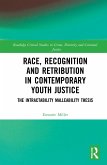
Broschiertes Buch
The Intractability Malleability Thesis
25. September 2023
Taylor & Francis
| Gebundenes Buch | 186,99 € | |
| eBook, ePUB | 42,95 € | |
| eBook, PDF | 42,95 € |

Gebundenes Buch
The Intractability Malleability Thesis
31. Dezember 2021
Taylor & Francis
eBook, ePUB
30. Dezember 2021
Taylor & Francis eBooks
eBook, PDF
30. Dezember 2021
Taylor & Francis eBooks
Gebundenes Buch
A Toolkit for Inclusion
1. März 2025
Palgrave Macmillan / Springer Nature Switzerland / Springer, Berlin
978-3-031-75561-3
| eBook, PDF | 32,95 € |
Ähnliche Artikel


Broschiertes Buch
Competing Futures For American Cities
1. Juli 2009
Taylor & Francis

Broschiertes Buch
8. Dezember 2016
Taylor & Francis


Broschiertes Buch
The Citizen-Migrant Distinction
1. November 2009
Duke University Press

Broschiertes Buch
November 2001
University of Nevada Press

Broschiertes Buch
Unravelling Marginalization, Voicing Change
11. November 2016
Taylor & Francis Ltd (Sales)

Broschiertes Buch
The Uneven Road from Impunity Towards Accountability
4. Dezember 2017
Taylor & Francis

Ähnlichkeitssuche: Fact®Finder von OMIKRON
